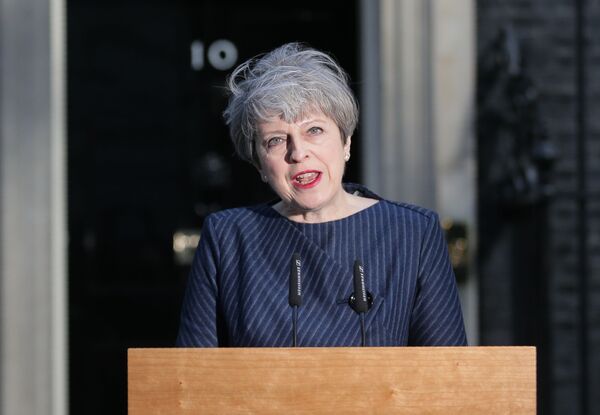When UK Prime Minister Theresa May formally invoked Article 50 of the Treaty of Lisbon, triggering Brexit, she stated that she wanted the two-year talks — a timeframe stipulated in the article — to consider Britain's new trade relationship with the EU alongside its divorce proceedings.
"I have been clear that we should seek to agree the terms of this future partnership alongside those of our withdrawal, within the next 2 years," she told parliament, March 29, the day she sent a letter to European Council President Donald Tusk, formally triggering Brexit.

'Divorce First Trade Later'
However, the EU made clear that the negotiations would be about "divorce" first and trade later, which is a crucial sticking point between the two parties. The other initial issues concern EU citizens' rights in the UK as well as the "divorce bill."
The draft guidelines being finalized in Luxembourg, April 27, currently state that the talks will be "phased" and that these issues must be tackled before trade talks can begin.
"The United Kingdom's decision to leave the Union creates significant uncertainties that have the potential to cause disruption, in particular in the UK but also in other Member States. Citizens who have built their lives on the basis of rights flowing from the British membership of the EU face the prospect of losing those rights. Businesses and other stakeholders will lose the predictability and certainty that come with EU law.With this in mind, we must proceed according to a phased approach giving priority to an orderly withdrawal," the guidelines say.
The core principle of the framework will start with EU citizens' rights in the UK and the rights of UK citizens within other EU member states. It seeks to protect the interests of around three million EU workers in Britain and their rights of residence after five years.
"The right for every EU citizen, and of his or her family members, to live, to work or to study in any EU member state is a fundamental aspect of the European Union. Along with other rights provided under EU law, it has shaped the lives and choices of millions of people," the draft principles state.
"Agreeing reciprocal guarantees to settle the status and situations at the date of withdrawal of EU and UK citizens, and their families, affected by the United Kingdom's withdrawal from the Union will be a matter of priority for the negotiations. Such guarantees must be enforceable and non-discriminatory."
What do academics and think-tanks say abt #Brexit? Our research service compiled main articles for you: https://t.co/pAhMERZgKu #eucolibrary pic.twitter.com/XVb0raONcF
— EU Council (@EUCouncil) 21 April 2017
It also states that Britain will have to stand by financial obligations it has already committed to for programs which extend after Brexit.
"A single financial settlement should ensure that the Union and the United Kingdom both respect the obligations undertaken before the date of withdrawal. The settlement should cover all legal and budgetary commitments as well as liabilities, including contingent liabilities," the draft guidelines state.



